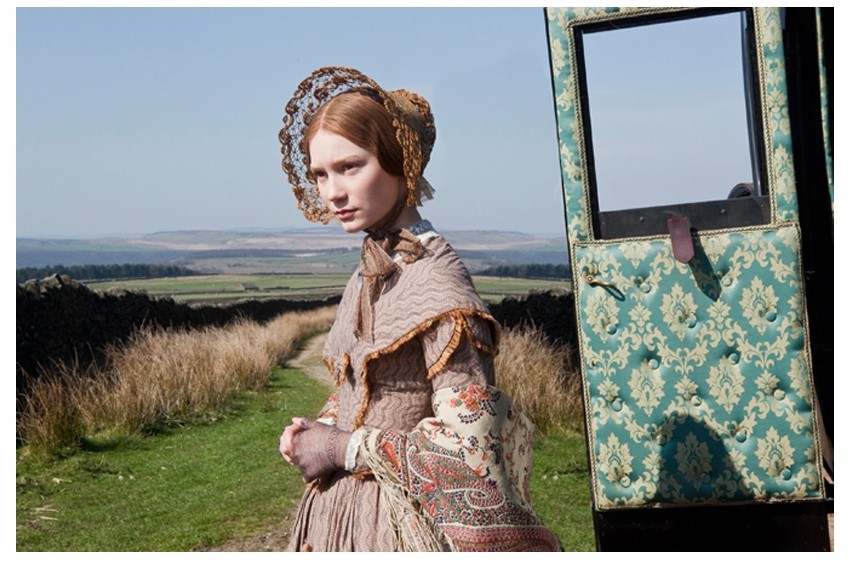I love the story of Jane Eyre more than life itself, which has never been much cop but, infuriatingly, I could not love this adaptation. I say ‘infuriating’ because what it does right it does very right. It is stunningly mounted, for example, with ferocious landscapes and howling winds and the sort of storms that split skies open. But what it does wrong is fatal, and the error is this: it just isn’t passionate or sexy enough. It is Jane Eyre with all the awful weather but minus the throb of erotic impulse. Jane and Rochester’s first kiss must, surely, be the most longed-for kiss in all of English literature — at last, a forbidden love expressed! — but when it happens here I did not feel a thing. I checked and double-checked but no, nothing. They might have been two strangers necking in a doorway. (Get a room!) I am still trying to figure out why and hope you will bear with me, even though it so rarely pays off.
Directed by Cary Fukunaga (Sin Nombre), with a bravely austere script by Moira Buffini, this begins not at the beginning but, quite cleverly, as Jane (Mia Wasikowska) is desperately fleeing Rochester (Michael Fassbender) and Thornfield across the rain-drenched moors, pursued by voices, to be eventually rescued by the Rivers family. How she reached this point is then told in flashback: flashbacks to her miserable childhood with that cruel aunt (Sally Hawkins), her years at that beastly Lowood School, and the death of her first and only friend, Helen, which is always a bummer, no matter how you brace yourself for it. I did feel this, actually, so it’s not as if I was having an entirely non-feeling kind of day.
Jane is 19, alone, and looking for somewhere to belong when she arrives at Thornfield to take up her position as governess to Rochester’s ward Adele. Thornfield is a happy place, full of light and laughter, or would be if only it weren’t so dark and gloomy and sombre and isolated, with gothic menace lurking in every creak, shadow and flicker of candlelight. I wouldn’t book it for a mini-break, if I were you. (Even your average Travelodge is more cheerful.) Mrs Fairfax is the housekeeper, as played by Judi Dench, the miraculous Judi Dench, who can somehow say all we need to know about her master’s long absences just by folding linen. (How does she do that? — how?)
Wasikowska, the Australian actress who, as Alice, was quite the best thing in Tim Burton’s pointless Alice in Wonderland, is no ‘plain Jane’ but she is pale and severe, and has the right ethereality. If only she weren’t so inert, pallid and expressionless. She does not take us to what Jane is feeling, and as the power of this story lies almost entirely within inner feelings, this is something of a blow. Fassbender as Rochester is hot, so hot that when he asks Jane if she finds him handsome and she says, ‘No, sir,’ you wonder if she ought to take a second look. He appears more powerfully Byronic than darkly troubled, and is also rather quick off the mark. Jane startles him off his horse and from then on he seems utterly captivated, even if she only has the one expression, which is a kind of level stare. It’s all rather hastily done, and this may be the problem. There is no smouldering build-up. It’s as if he is well used to ravishing governesses whenever they happen to truck up. At what point did she melt his icy heart? At what point did she realise he was the other half of her own soul? It’s so fast it’s not as if you are even given time to feel anything. (In all fairness, I should say that part of me can’t help comparing it to the BBC’s 2006 adaptation starring Toby Stephens and Ruth Wilson, which was so sublime, and so on fire, that when they kissed my knees turned to water.)
But the cinema is not TV, just as neither can ever be the book, and it would be stupid to think that they could. But I do wonder if Ms Buffini has made the wisest excisions. There is some humour in Jane Eyre, particularly with Jane’s teasing of Mr Rochester — his wild hair, if I recall rightly, is the source of much mirth to her — but the austerity of the script allows for none of this, making it all rather dry. And as for Mrs Rochester, she almost appears as an afterthought. There are no loud bangs or deranged laughs in the middle of the night. No high windows that are sometimes open and sometimes closed. No Grace Poole, even. Mrs Rochester comes and goes in a single, mad burst, so where is the tension? Nowhere, that’s where.
Look, this Jane Eyre is not a complete failure because, like I said, what it does right it does very right, and you can’t help but admire how painterly it is, and how desolate the moors. And although I didn’t feel it, I wasn’t exactly bored either. But I wanted to love it and found I could not. Dear reader, that’s just the way it is sometimes. Sorry.






Comments